A multi channel eCommerce platform helps businesses sell on multiple online channels while managing everything in one place. It streamlines inventory, orders, and customer interactions across different platforms. This allows businesses to expand their reach and provide a seamless shopping experience.
However, choosing the right platform can be challenging since each solution offers different features, integrations, and pricing. That's why LitExtension – #1 eCommerce Migration Expert craft this resource to help you decide which multi channel eCommerce platform is best for your business.
In this guide, we will explore:
- What is multi channel eCommerce;
- The benefits of multi channel eCommerce;
- Best multi channel eCommerce platform for your consideration;
- Best multi channel marketplace to expand your reach;
- Best multi channel eCommerce software for better management.
Now, let's get started!
Multi channel eCommerce At A Glance
What is multi channel eCommerce?
Multi channel eCommerce is the practice of selling products across multiple online platforms instead of relying on a single store. Businesses can reach customers through their website, marketplaces like Amazon and eBay, social media stores, and even physical retail locations.
A multi channel eCommerce platform helps businesses manage all these sales channels from one system. It syncs inventory, processes orders, and ensures pricing consistency. Without a centralized system, managing multiple channels can become overwhelming, leading to errors and stock issues.
The benefits of multi channel eCommerce
1. Increased sales opportunities
With a multi channel eCommerce platform, you can sell on multiple marketplaces, social commerce platforms, and your own website. This increases your brand’s visibility and allows you to capture sales from different audiences. A broader online presence means more touchpoints with customers, leading to higher conversions and revenue growth.
2. Diversified revenue streams
By selling on multiple channels, you reduce dependence on any single platform. A multi channel eCommerce platform allows you to diversify income sources, making your business more resilient to industry shifts, economic fluctuations, or algorithm changes. If one channel underperforms, your sales from other platforms can help balance the impact.
3. Better customer experience and convenience
A multi channel eCommerce platform enables businesses to meet customers where they are. It provides a seamless shopping experience across platforms, ensuring consistency in product listings, pricing, and availability. This makes it easier for customers to engage with your brand, increasing their chances of making a purchase.
Additionally, customers can choose different delivery options, payment methods, and return policies depending on the platform they shop from. Providing these options enhances their shopping experience and builds trust in your brand.
4. Improved brand awareness and market penetration
Selling on multiple channels increases your brand's exposure. Each sales platform has its own audience, and by expanding your presence, you reach more potential buyers.
For example, shoppers searching for products on Amazon may discover your brand for the first time. Meanwhile, social media users scrolling through Instagram or Facebook may come across your ads or tagged products. By leveraging multiple platforms, you increase touchpoints with potential customers, which enhances brand recognition.
Moreover, a multi channel eCommerce platform allows you to maintain brand consistency across different channels. From product descriptions to pricing and customer service, having a unified approach strengthens your credibility and helps customers remember your brand.
5. Centralized inventory and order management
Managing inventory manually across different platforms is time-consuming and prone to errors. Overselling products, stock shortages, or incorrect order processing can lead to frustrated customers and negative reviews.
A multi channel eCommerce platform provides a centralized dashboard where you can track inventory across all channels in real time. When a customer makes a purchase on one platform, stock levels automatically update across others. This prevents overselling and helps maintain accurate stock availability.
Additionally, automated order synchronization ensures that customer orders from different platforms are processed efficiently. This reduces the risk of shipping errors and streamlines fulfillment, allowing you to maintain fast and reliable delivery times.
Best Multi Channel eCommerce Platform for Your Consideration
Choosing the right multi channel eCommerce platform is crucial for businesses looking to expand their reach across multiple sales channels. The best platforms provide seamless integration with marketplaces, social commerce, and third-party tools while offering automation, centralized inventory management, and powerful analytics.
Below, we explore five top multi-channel eCommerce platforms, detailing their key features and ideal use cases to help you make the best choice for your business.
1. Shopify
Shopify user ratings: 4.8/5 on Capterra | 4.4/5 on G2
Shopify is perhaps the most widely used multi channel eCommerce platform, known for its ease of use, scalability, and extensive integrations. It allows businesses to sell across multiple channels, including their online store, marketplaces, social media, and even in-person through Shopify POS.
Whether you are a small business starting out or a growing brand looking to scale, Shopify features provide the necessary tools to manage multiple sales channels from a single dashboard. With its robust app marketplace, users can extend functionalities to automate processes, enhance marketing, and streamline operations.

Key features that Shopify offers:
- Sell on several marketplaces (like Amazon, eBay, Walmart,…) to expand your sales.
- Connect with social commerce platforms like Instagram Shopping and TikTok Shop.
- Sell and sync inventory between physical and digital stores with Shopify POS.
- Manage orders efficiently across different sales channels through an integrated fulfillment system.
- Prevent overselling with automatic stock updates.
Who is Shopify best for?
Shopify is ideal for small to medium-sized businesses that want a user-friendly, scalable, and all-in-one multi channel eCommerce platform. It’s perfect for brands that want to sell across multiple channels without a heavy technical setup.
2. BigCommerce
BigCommerce user ratings: 4.4/5 on Capterra | 4.2/5 on G2
BigCommerce is a powerful multi channel eCommerce platform designed for growing businesses and enterprises. It offers built-in multi-channel selling features, eliminating the need for excessive third-party apps. With strong scalability, advanced SEO tools, and API-driven flexibility, BigCommerce is an excellent choice for businesses looking to expand across multiple platforms.
Unlike Shopify, BigCommerce does not charge additional transaction fees, making it a cost-effective option for businesses processing high sales volumes. Its robust integration with marketplaces, social commerce, and B2B functionalities makes it a top contender for businesses with diverse selling strategies.
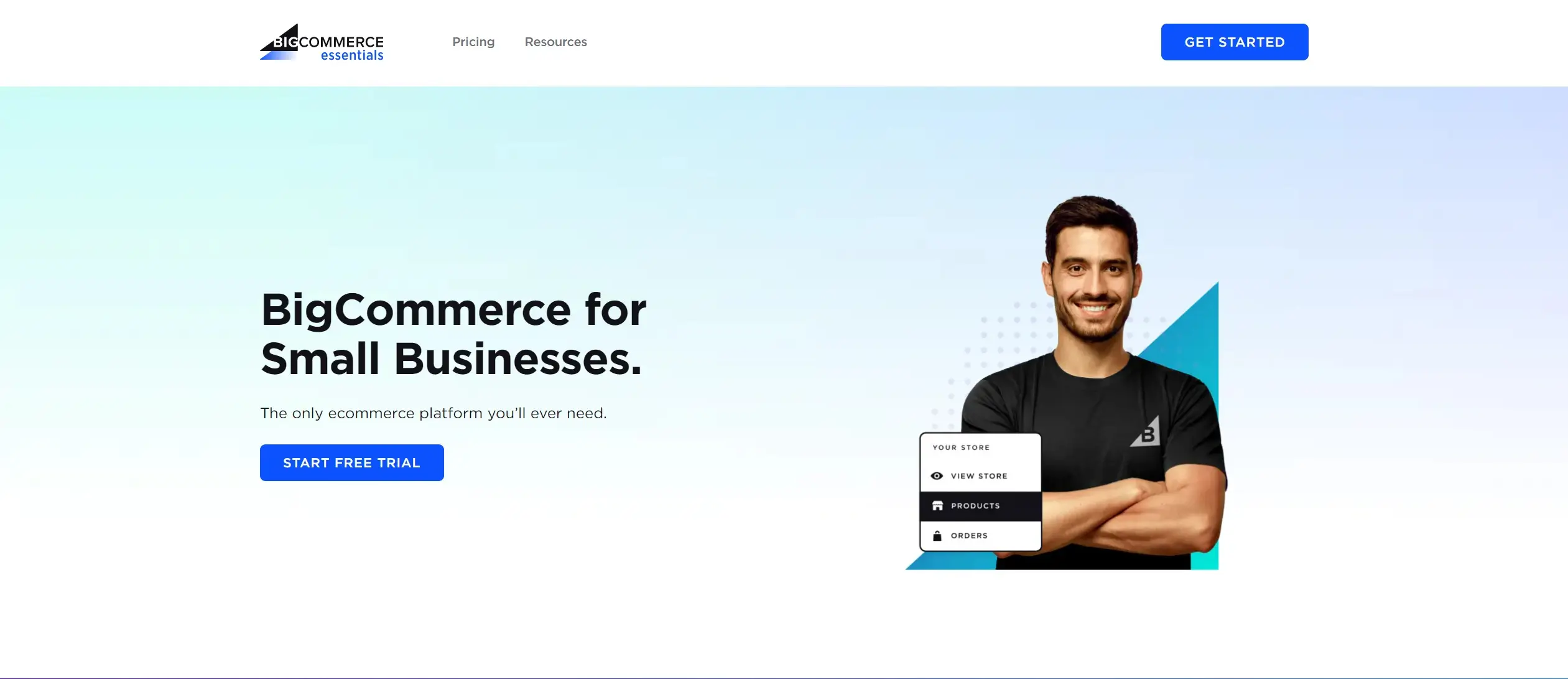
Key multi channel selling features that BigCommerce offers:
- Sell on Amazon, eBay, Walmart, and Google Shopping without needing third-party apps.
- Seamless connection with Facebook, Instagram, TikTok, and Pinterest for social commerce.
- Native B2B and wholesale functionality for business-focused merchants.
- Real-time inventory synchronization across multiple sales channels.
Who is BigCommerce best for?
BigCommerce is best for growing and mid-to-large-sized businesses that need a scalable, cost-effective, and feature-rich multi channel eCommerce platform. It’s ideal for:
- Brands looking to expand into marketplaces and B2B selling.
- Businesses that want deep customization and API flexibility.
- Sellers processing high order volumes and seeking lower costs.
3. Adobe Commerce
Adobe Commerce user ratings: 4.3/5 on Capterra | 4.0/5 on G2
Adobe Commerce (formerly Magento) is a highly customizable multi channel eCommerce platform designed for businesses that need full control over their online operations. It is ideal for enterprises that require deep integrations, scalability, and tailored multi-channel solutions.
Unlike Shopify and BigCommerce, Adobe Commerce is self-hosted (or cloud-based with Adobe), providing businesses with the flexibility to customize every aspect of their store and connect with multiple sales channels.
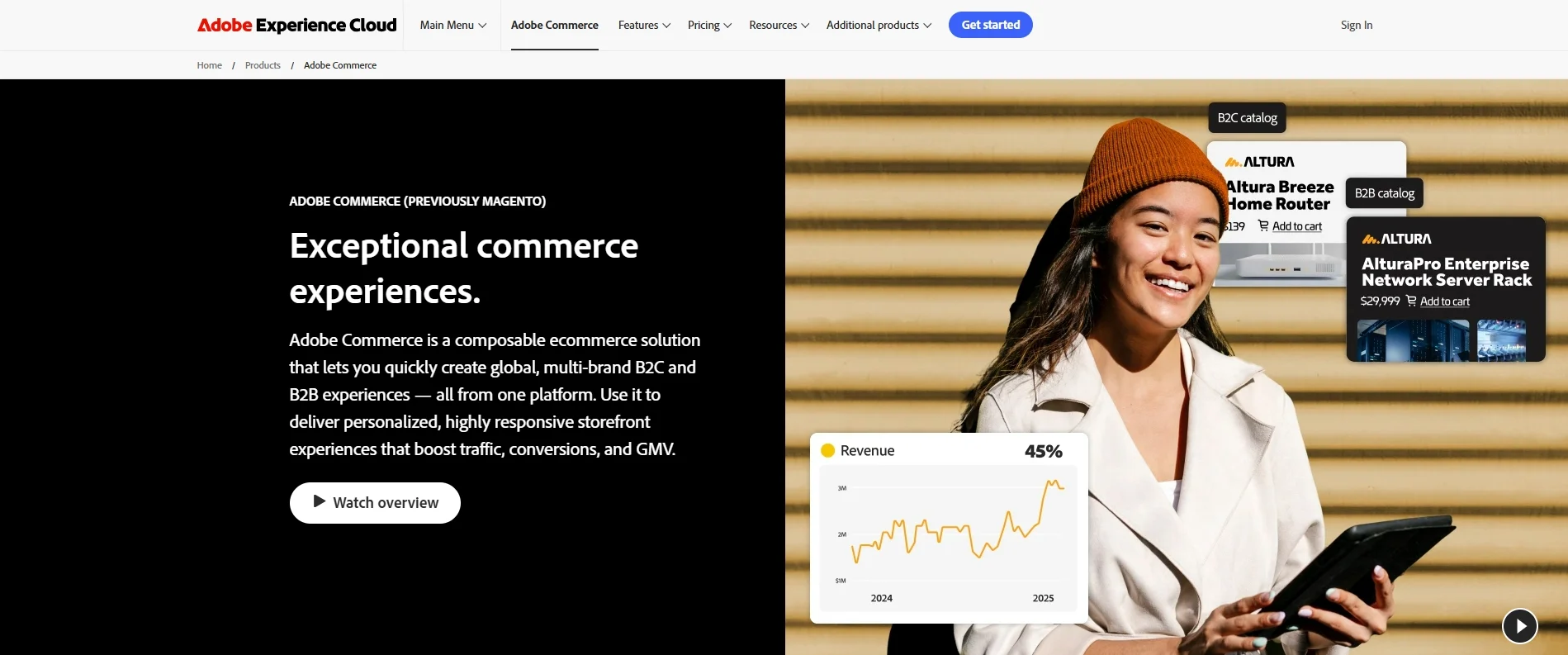
Key features that Adobe Commerce offers:
- Manage multiple online stores from a single admin panel.
- Sell across marketplaces like Amazon, eBay, and Walmart with integration extensions.
- Create localized storefronts for international selling with different currencies and languages.
- Sync inventory and orders between Adobe Commerce, retail locations, and warehouses.
- Enable multi-source inventory tracking for efficient order fulfillment.
Who is Adobe Commerce best for?
Adobe Commerce is best for large enterprises and businesses with complex multi-channel needs. It’s ideal for:
- Retailers and wholesalers managing multiple storefronts and warehouses.
- Brands needing deep ERP and POS integration for omnichannel commerce.
- Businesses that require full control over their multi-channel selling strategy.
4. WooCommerce
WooCommerce user ratings: 4.5/5 on Capterra | 4.0/5 on G2
WooCommerce is a flexible multi channel eCommerce platform built for WordPress users. It is an open-source solution that allows businesses to sell across multiple channels using third-party integrations and plugins. Unlike Shopify or BigCommerce, WooCommerce requires some technical setup but offers unlimited customization and control over multi-channel selling strategies.
For businesses looking to expand beyond a single website, WooCommerce supports marketplace integrations, social commerce, and multi-store capabilities through extensions and plugins.
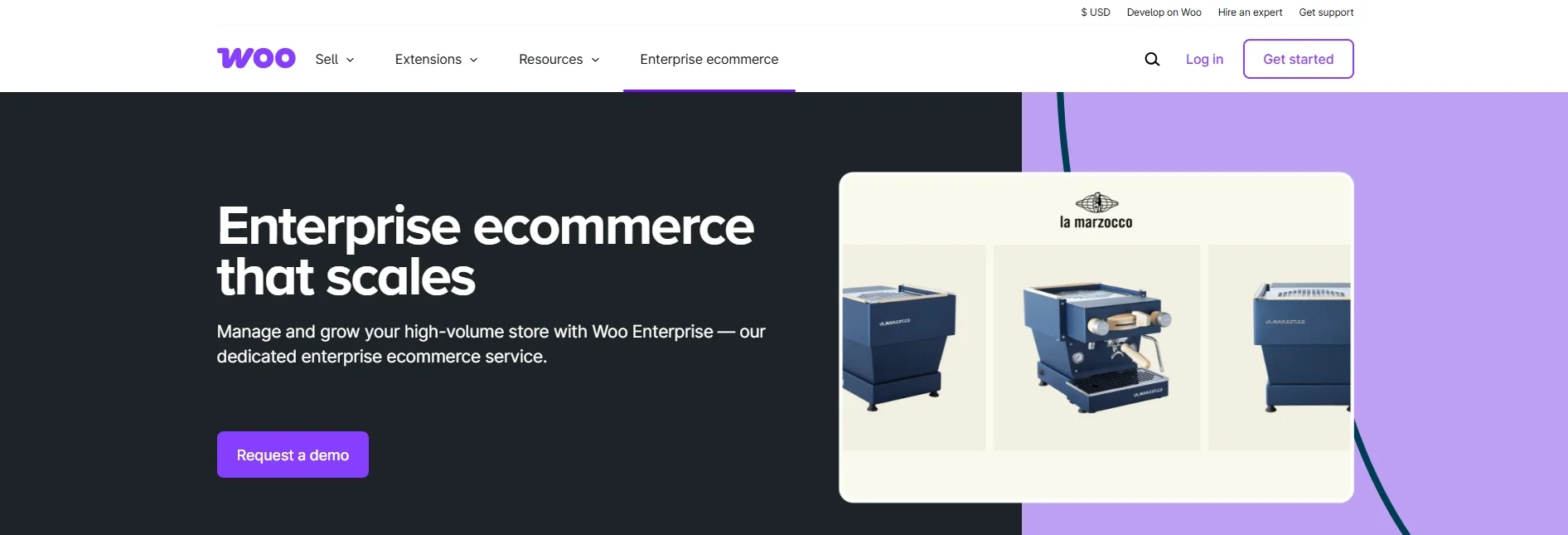
Key features that WooCommerce offers:
- Sell on Amazon, eBay, Walmart, and Google Shopping through third-party plugins.
- Sync inventory, product listings, and orders between WooCommerce and marketplaces.
- Automate pricing and listing updates to maintain consistency across channels.
- Extend multi channel selling with WooCommerce API and REST integrations.
Who is WooCommerce best for?
WooCommerce is best for small to medium businesses that want a cost-effective, flexible, and open-source multi channel eCommerce platform. It’s ideal for:
- WordPress users looking to expand into marketplaces and social commerce.
- Businesses that need full control over their store with customizable multi-channel workflows.
- Sellers who prefer a self-hosted solution without monthly platform fees.
5. Salesforce Commerce Cloud
Salesforce Commerce Cloud user ratings: 4.5/5 on Capterra | 4.3/5 on G2
Salesforce Commerce Cloud is a highly scalable multi channel eCommerce platform designed for enterprise businesses. It provides AI-driven personalization, deep customer insights, and seamless multi-channel integration, making it ideal for brands that sell across multiple online and offline touchpoints.
Salesforce Commerce Cloud is built for large-scale, data-driven businesses that need advanced automation, omnichannel commerce capabilities, and CRM integration.
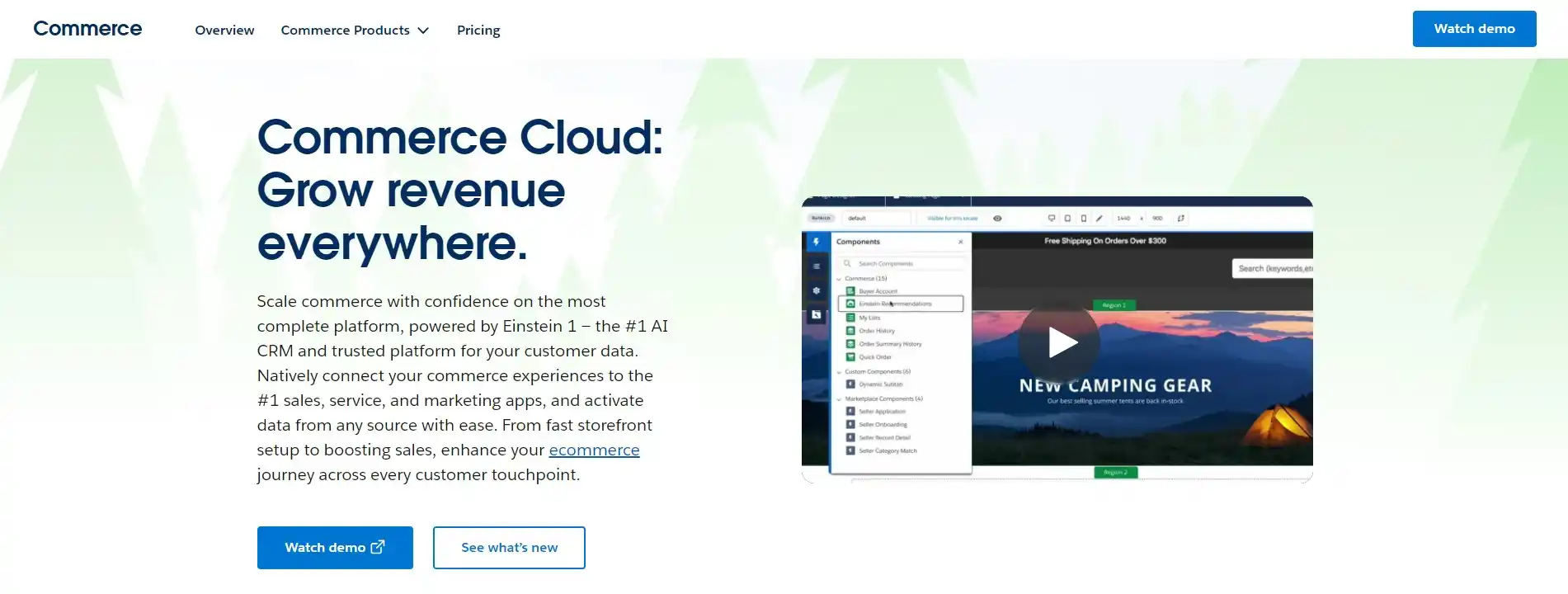
Key features that Salesforce Commerce Cloud offers:
- Sell across Amazon, eBay, Google Shopping, Walmart, and other marketplaces.
- Manage multiple sales channels, inventory, and pricing from a single dashboard.
- Automate order fulfillment workflows across different channels.
- Sync customer data and purchase history between online and offline channels via POS integration.
- Leverage Salesforce Einstein AI to personalize product recommendations across multiple sales channels.
Who is Salesforce Commerce Cloud best for?
Salesforce Commerce Cloud is best for large enterprises and global brands that need AI-powered, data-driven multi-channel selling. It’s ideal for:
- Businesses managing both B2B and B2C sales across multiple channels.
- Retailers with strong omnichannel strategies, including in-store and online sales.
- Companies that require deep CRM and AI-driven personalization for customer engagement.
Best Multi channel Marketplace to Expand Your Reach
Selling across multiple platforms is a key strategy for businesses looking to increase visibility and reach more customers. In the previous section, we explored the best multi channel eCommerce platforms, which help manage sales across different channels. However, to maximize growth, businesses must also leverage the right marketplaces where customers are actively shopping.
Marketplaces like Amazon, eBay, and Etsy already have millions of active buyers. These platforms provide built-in traffic, trust, and tools that make it easier for businesses to sell products without needing to drive traffic independently. When combined with a multi channel eCommerce platform, businesses can seamlessly sync inventory, process orders, and expand their customer base without extra manual effort.
Below, we’ll explore the best multi-channel marketplaces that businesses can use to expand their reach, increase sales, and enhance their online presence.
1. Amazon
Amazon user ratings: 4.7/5 on Capterra | 4.5/5 on G2
Amazon is the largest online marketplace, attracting millions of shoppers daily. It dominates global eCommerce, making it an essential sales channel for businesses looking to scale quickly and reach a massive customer base. With built-in trust, fast shipping options, and advanced marketing tools, Amazon offers businesses a powerful platform to increase visibility and sales.
Selling on Amazon can be highly competitive, but with the right multi channel eCommerce platform, businesses can sync inventory, automate order fulfillment, and optimize their product listings for better performance.

Key features of Amazon:
- Allows businesses to fulfill orders from other sales channels (e.g., Shopify, eBay).
- Sync inventory and orders across Amazon and other marketplaces using platforms like Shopify, BigCommerce, or WooCommerce.
- Automate pricing strategies to stay competitive using dynamic repricing tools.
- Expand into multiple Amazon marketplaces, including Amazon UK, Canada, Europe, and Australia.
Who is Amazon best for?
Amazon is ideal for businesses looking to scale quickly and access a massive customer base. It’s best suited for:
- Brands selling high-demand consumer goods.
- Retailers who want to leverage FBA for hands-off fulfillment.
- Businesses expanding internationally through Amazon’s global marketplaces.
2. eBay
eBay is a well-established marketplace with a global presence, offering businesses access to millions of buyers across different regions. Known for its auction-style listings and flexible pricing models, eBay is ideal for businesses selling unique, collectible, and second-hand items, as well as new products across various categories.
Integrating eBay with a multi channel eCommerce platform allows businesses to manage inventory, orders, and pricing across multiple sales channels efficiently, ensuring a seamless selling process.
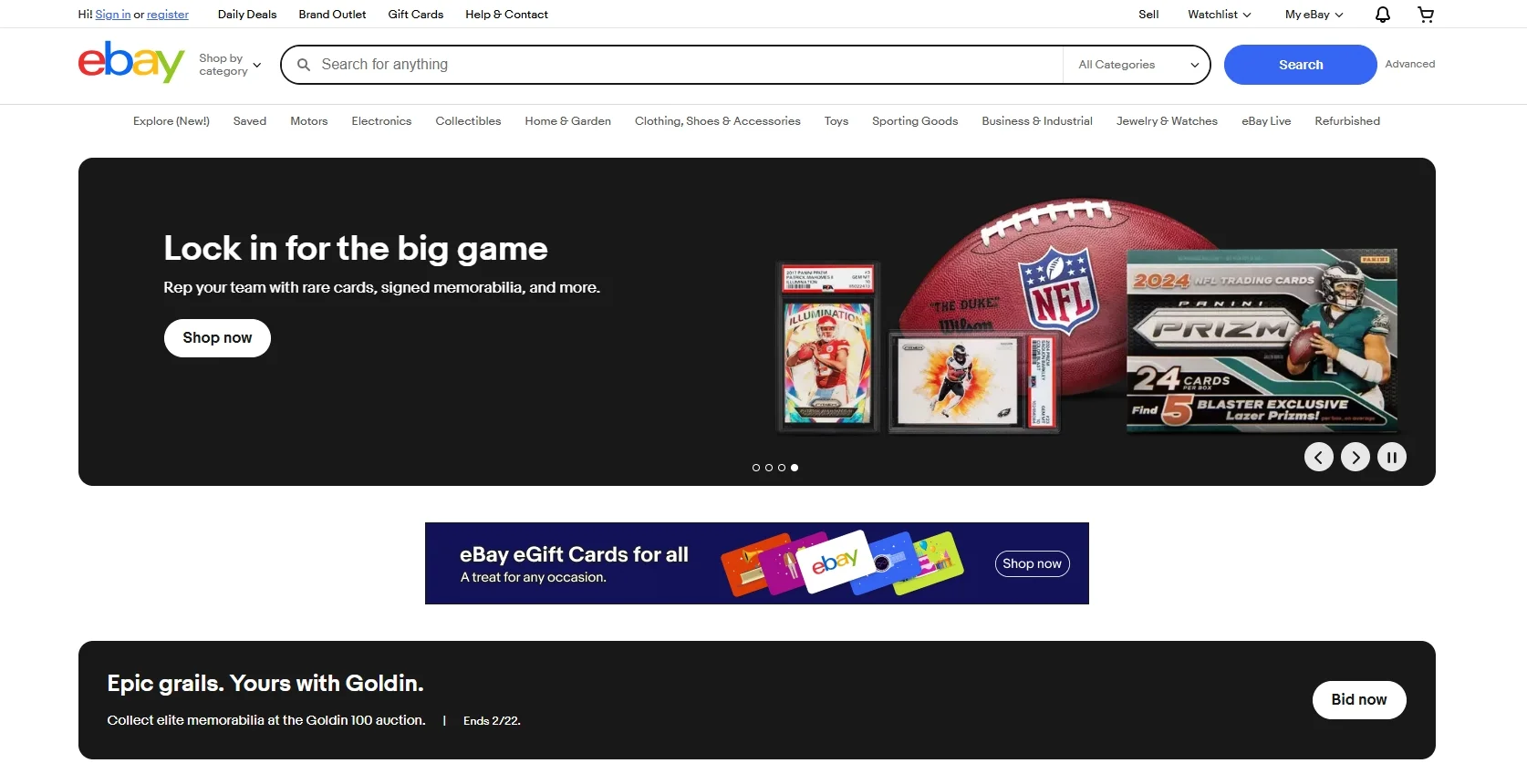
Key features that eBay offers:
- Integrate eBay with a multi channel eCommerce platform to sync inventory and automate order processing across all channels.
- Automate tasks like product listing updates, pricing adjustments, and stock synchronization to avoid overselling.
- Choose between auction listings for competitive bidding or fixed-price listings for stable pricing.
- Offer bulk listings and discounts for wholesale or bulk sales.
Who is eBay best for?
eBay is best for businesses that want to sell unique, collectible, and bulk products while reaching an international audience. It’s ideal for:
- Small to medium-sized businesses looking to expand beyond their website.
- Retailers selling used, vintage, or rare products.
- Brands aiming to diversify their sales channels with auction-based pricing.
3. Etsy
Etsy is a popular marketplace for handmade, vintage, and personalized products, attracting millions of buyers looking for unique, creative items. For businesses in the arts, crafts, and vintage niches, Etsy provides a targeted audience that values creativity and craftsmanship.
Using a multi channel eCommerce platform to integrate Etsy with other sales channels allows businesses to manage inventory, process orders, and maintain consistent pricing across multiple platforms, ensuring a smooth and efficient selling process.
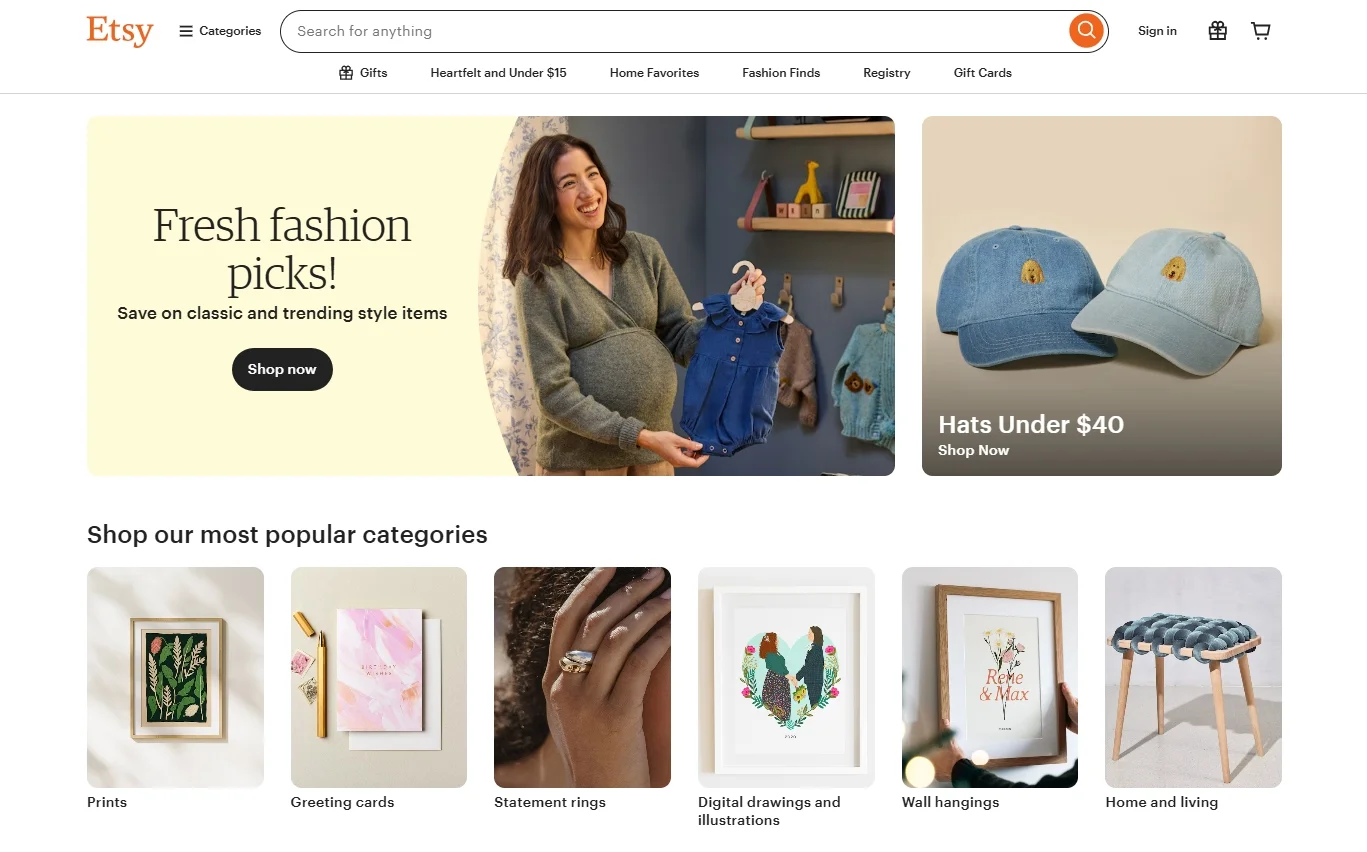
Key features that Etsy offers:
- Offers simple tools for product listings, marketing, and shipping, making it accessible for small businesses and individual sellers.
- Use social media integrations to promote your Etsy store on platforms like Instagram and Pinterest.
- Seamlessly integrate Etsy with your store using a multi channel eCommerce platform such as Shopify, WooCommerce, or BigCommerce.
- Sync inventory, product listings, and orders across Etsy and other sales channels to avoid overselling and reduce manual work.
Who is Etsy best for?
Etsy is perfect for creative entrepreneurs and small businesses that sell handmade, vintage, or personalized products. It’s ideal for:
- Artisans, crafters, and artists looking to reach a niche audience.
- Businesses selling customized or personalized items.
- Sellers wanting to expand beyond Etsy using a multi-channel strategy.
Best Multi Channel eCommerce Software for Better Management
Expanding your business across multiple sales channels offers immense growth potential, but managing inventory, orders, and listings across platforms can quickly become overwhelming. This is where multi channel eCommerce platform software becomes essential.
With the right tools, businesses can synchronize product listings, track inventory in real-time, automate order processing, and optimize pricing across marketplaces like Amazon, eBay, Etsy, and their own online store. A reliable multi channel eCommerce platform not only saves time but also reduces errors and ensures a seamless customer experience.
Below are some of the best multi-channel eCommerce software solutions designed to help businesses manage multiple sales channels efficiently, enabling them to focus on growth and customer satisfaction.
1. LitCommerce
LitCommerce user ratings: 4.9/5 on Trustpilot
LitCommerce stands out as one of the best multi channel eCommerce platform solutions that helps businesses manage multiple sales channels effectively. Positioned as an all-in-one multichannel selling solution, it allows merchants to streamline product, order, and customer management from a single dashboard.
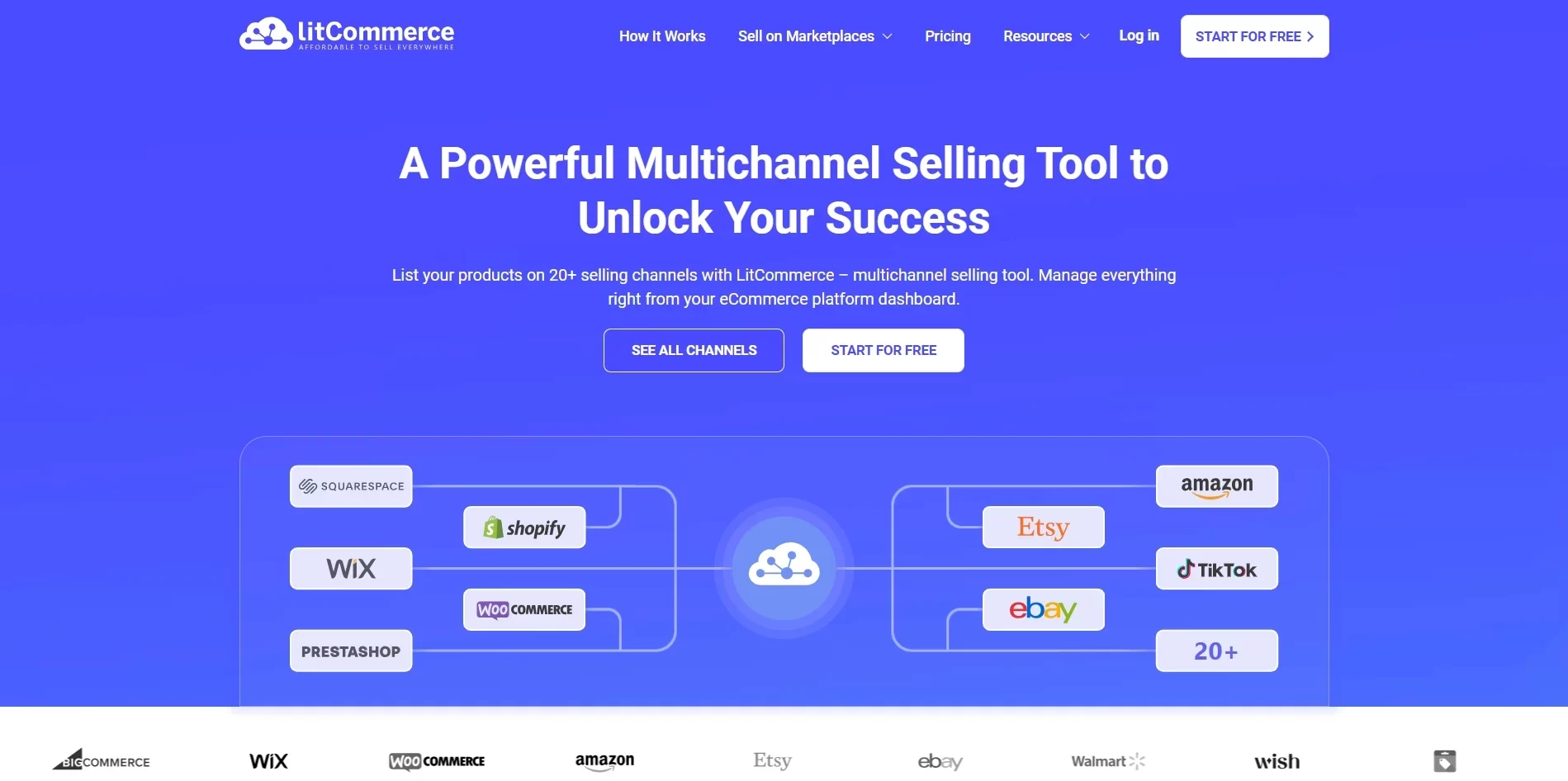
The platform offers direct integration with popular eCommerce builders such as Shopify, WooCommerce, BigCommerce, and Wix, while supporting product listings on over 20 major marketplaces, including Amazon, eBay, Etsy, and Google Shopping. Its listing tool is designed to enhance workflow efficiency, reduce errors like overselling or underselling, and centralize operations through the main store.
In addition, LitCommerce includes a product feed management tool that supports advertising across 350+ global channels. With 2,500+ pre-built templates and guaranteed uptime, it helps sellers maintain accurate data and optimize return on ad spend.
Key features that LitCommerce offers:
- Manage product listings, inventory, and orders from multiple channels in one place.
- View all sales activities, stock levels, and order statuses without switching between platforms.
- List products on Amazon, eBay, Etsy, Facebook, and Google Shopping in bulk.
- Edit product details, pricing, and descriptions for all channels simultaneously.
- Enjoy essential multi-channel features without the high costs of enterprise-level software.
Who is LitCommerce best for?
LitCommerce is the ideal multi channel eCommerce platform for small to medium-sized businesses and budget-conscious users who need reliable multi-channel management without high costs. It’s perfect for:
- Startups and small businesses expanding into multiple marketplaces.
- Sellers on a budget looking for essential tools for inventory syncing and order management.
- Businesses managing a few sales channels and seeking an affordable, easy-to-use solution.
2. Sellbrite
Sellbrite user ratings: 4.2/5 on Trustpilot
Sellbrite is another top-rated multi channel eCommerce platform known for its intuitive user interface and powerful automation tools. It simplifies managing sales across platforms like Amazon, eBay, Walmart, Etsy, and Google Shopping, making it easy for businesses to list products, sync inventory, and fulfill orders without hassle.
For businesses seeking a solution that reduces manual work, Sellbrite offers automation features that streamline product management, pricing updates, and order processing. Its seamless integration with Shopify, BigCommerce, WooCommerce, and Magento makes Sellbrite a great choice for growing businesses.
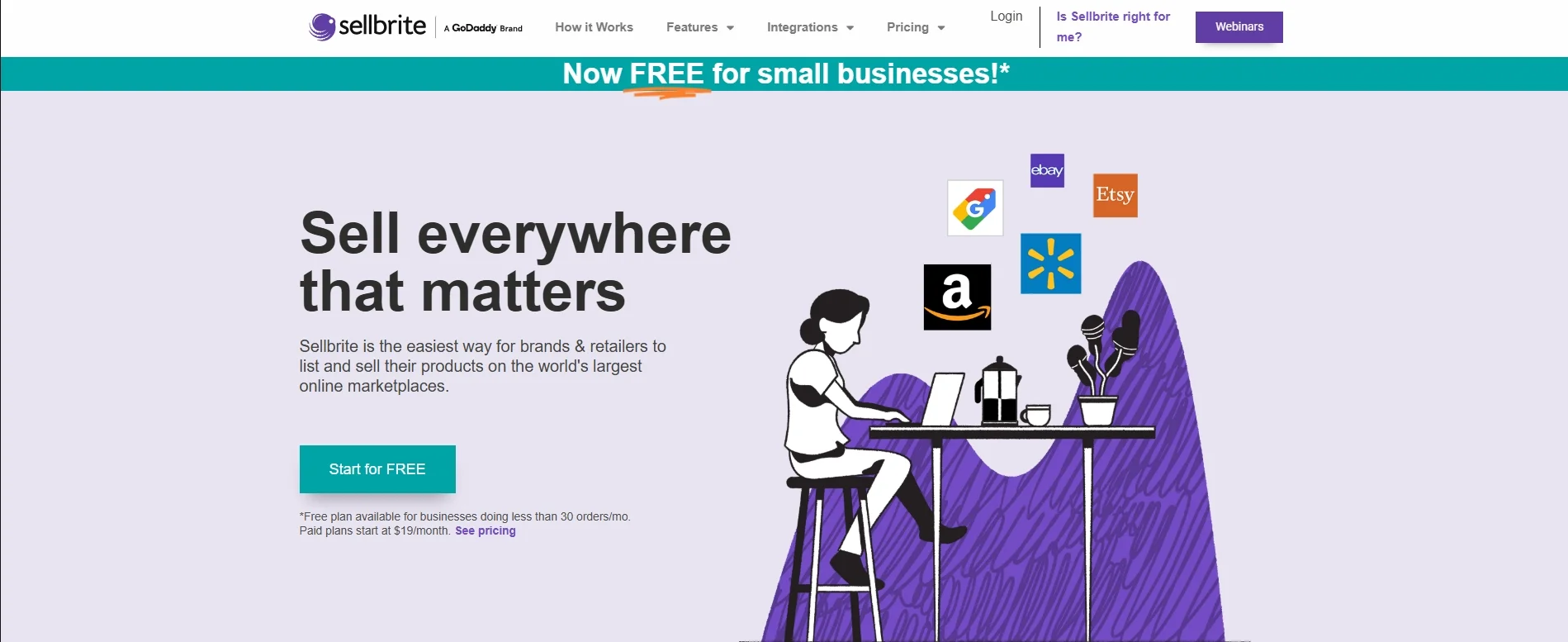
Key features that Sellbrite offers:
- Manage all sales channels, including Amazon, eBay, Walmart, Etsy, and more, from a single dashboard.
- Monitor product listings, inventory levels, and order statuses in real time.
- Automatically update inventory counts across multiple marketplaces when a sale is made.
- List products in bulk across all connected sales channels.
Who is Sellbrite best for?
Sellbrite is the ideal multi-channel eCommerce platform for growing businesses that need a user-friendly interface and automation tools to manage multiple sales channels efficiently. It’s perfect for:
- Small to medium-sized businesses looking to automate multi-channel operations.
- Retailers selling on Amazon, eBay, Walmart, and Etsy who need seamless inventory management.
- Businesses that manage multiple warehouses and need automated order routing.
3. Channable
Channable user ratings: 4.2/5 on Trustpilot
Channable is a versatile multi channel eCommerce platform designed for businesses that need advanced product feed management and PPC automation. It helps businesses sell across Amazon, eBay, Google Shopping, Facebook, Instagram, and other marketplaces.
Channable’s powerful feed management tools allow businesses to optimize product data, manage inventory, and automate ads, making it a top choice for those running multi-channel marketing campaigns alongside their eCommerce operations.
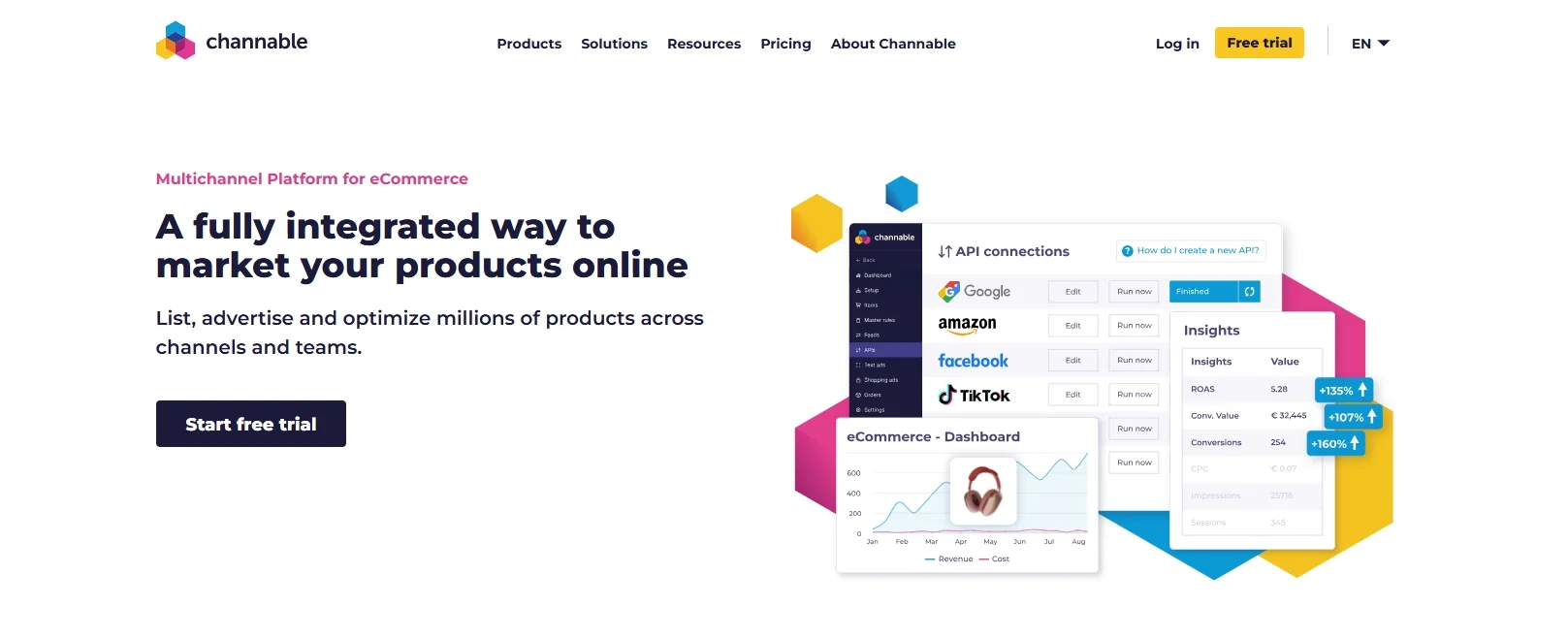
Key features that Channable offers:
- Create, manage, and optimize product feeds for Amazon, eBay, Google Shopping, Facebook Ads, and more.
- Use dynamic rules to adjust pricing, product descriptions, and categories for each platform.
- Sync inventory levels automatically across all connected channels.
- Integrate with Shopify, WooCommerce, BigCommerce, Magento, and other eCommerce platforms for order fulfillment.
Who is Channable best for?
Channable is the ideal multi channel eCommerce platform for businesses managing large product catalogs and running multi-channel marketing campaigns. It’s perfect for:
- Retailers needing advanced product feed management for Google Shopping, Amazon, and social media ads.
- Businesses running PPC campaigns who need automated ad updates based on real-time product data.
- eCommerce brands with extensive product listings looking to expand across multiple platforms while maintaining data accuracy.
Multi Channel eCommerce Platform – FAQs
What is the difference between multichannel and omnichannel eCommerce?
The difference between multichannel and omnichannel eCommerce lies in how sales channels are managed and connected:
- Multi channel eCommerce involves selling on multiple platforms (e.g., Amazon, eBay, social media, and a website) but managing each channel independently or through a central platform.
- Omnichannel eCommerce focuses on creating a seamless customer experience across all channels. It integrates online and offline experiences, such as in-store pickup for online orders, mobile app promotions, and synchronized customer service.
What is an example of an eCommerce channel?
An eCommerce channel is any online platform where businesses sell products to customers. Examples include Amazon, eBay, Etsy, and Walmart for marketplaces, Shopify, WooCommerce, and BigCommerce for dedicated online stores, and Facebook Shops, Instagram Shopping, and TikTok Shop for social commerce. Each channel offers unique tools and audiences, and using a multi channel eCommerce platform helps manage them efficiently.
What are the different types of eCommerce platforms?
There are several types of eCommerce platforms that businesses can use, including:
- Hosted platforms: Solutions like Shopify and BigCommerce that provide hosting, security, and maintenance.
- Open-source platforms: Self-hosted solutions like WooCommerce, Magento (Adobe Commerce), and PrestaShop that allow full customization.
- Marketplace platforms: Online marketplaces such as Amazon, eBay, and Etsy where sellers list products directly.
- Headless commerce platforms: Flexible solutions that separate the front-end and back-end, like Salesforce Commerce Cloud and Commercetools.
Final Thoughts
Choosing the right multi channel eCommerce platform is essential for businesses aiming to expand their online presence and boost sales across multiple channels. With the growing number of marketplaces, social commerce platforms, and eCommerce websites, managing operations manually can be overwhelming and prone to errors.
If you like this article, don't forget to check out other blogs about eCommerce platforms on our website for more expert tips and insights.

